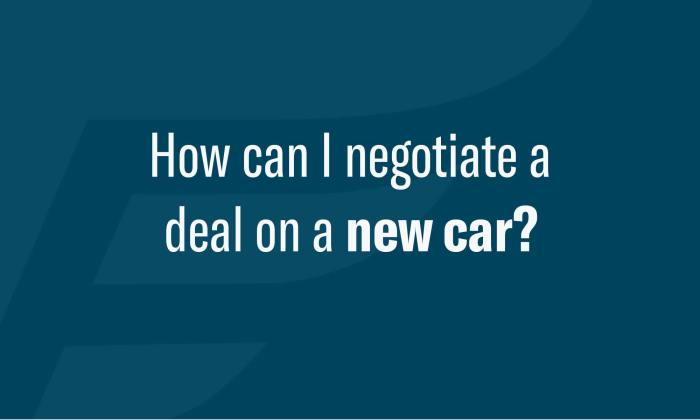How to Negotiate New Car Price When Paying Cash
Negotiating a New Car Price When Paying Cash: How To Negotiate New Car Price When Paying Cash
How to negotiate new car price when paying cash – Purchasing a new car is a significant investment, and knowing how to negotiate effectively, especially when paying cash, can save you a substantial amount of money. This guide provides a structured approach to navigating the car buying process, maximizing your leverage as a cash buyer, and securing the best possible deal.
Researching the Market Value
Before stepping foot in a dealership, thorough market research is crucial. This involves determining the fair market price of the car you desire, considering factors such as model, year, features, and location. Different online resources offer varying levels of detail and accuracy; understanding their strengths and limitations is essential.
- Utilize Online Pricing Tools: Websites like Kelley Blue Book (KBB), Edmunds, and TrueCar provide estimated market values based on vehicle specifications and location. Input the exact model, year, trim level, and features to get a precise estimate. Remember that these are estimates; the actual price may vary.
- Check Dealer Websites: Browse the websites of multiple dealerships in your area to compare prices for the same car model. Pay attention to any advertised deals or incentives. Be wary of unusually low prices, as they may come with hidden costs or restrictions.
- Verify Pricing Accuracy: Cross-reference the prices from multiple online sources. Significant discrepancies might indicate errors or inconsistencies. Contact dealerships directly to confirm the listed prices and inquire about any additional fees.
| Dealership | Model | Year | Price |
|---|---|---|---|
| Acme Motors | Toyota Camry | 2024 | $28,500 |
| Best Cars Inc. | Toyota Camry | 2024 | $29,200 |
| City Auto Sales | Toyota Camry | 2024 | $28,900 |
Preparing for Negotiation

Source: rydeshopper.com
Even when paying cash, pre-approval for financing can significantly strengthen your negotiating position. It demonstrates your financial readiness and provides a benchmark for comparison with the dealer’s financing offers. Confidence and composure are equally important during negotiations.
- Secure Pre-Approval: Obtain pre-approval from a bank or credit union for a car loan, even if you intend to pay cash. This establishes your creditworthiness and gives you a leverage point.
- Project Confidence: Maintain a calm and confident demeanor throughout the negotiation. Avoid appearing desperate or overly eager. Know your target price and stick to it.
- Develop Negotiation Tactics: Consider both aggressive and collaborative approaches. Aggressive tactics might involve making a low initial offer and gradually increasing it. Collaborative tactics focus on finding a mutually beneficial solution.
The Negotiation Process
Starting with a lower offer than your target price is a common and effective negotiation tactic. This gives you room to negotiate and allows you to assess the dealer’s willingness to compromise. Highlighting your cash payment as a benefit can also be advantageous.
- Initial Offer: Begin with an offer slightly below the lowest price you’ve researched. Justify your offer by referencing your research and the car’s market value.
- Counter-Offers: Respond to dealer proposals with counter-offers that reflect your research and budget. Emphasize the convenience and speed of a cash transaction.
- Addressing Objections: Politely but firmly address any objections or pushbacks from the dealer. Reiterate your position and the benefits of a cash sale.
Addressing Additional Costs

Source: endurancewarranty.com
Beyond the sticker price, several additional costs can significantly impact the final price. These include dealer fees, taxes, registration, and documentation fees. Negotiating these costs is crucial to controlling your overall expenses.
- Cost Checklist: Create a checklist including dealer fees, taxes, registration fees, and any other potential charges. Inquire about the specifics of each fee and negotiate wherever possible.
- Negotiating Additional Costs: While some fees are non-negotiable (like taxes), others, such as dealer fees, are often open to negotiation, especially with a cash buyer.
| Cost Item | Cash Purchase | Financing |
|---|---|---|
| Total Vehicle Price | $28,000 | $28,000 |
| Taxes & Fees | $2,000 | $2,000 |
| Total Out-of-Pocket | $30,000 | $30,000 + interest |
Securing the Deal, How to negotiate new car price when paying cash

Source: a4a.site
Before finalizing the purchase, carefully review all documents to avoid potential pitfalls. A written agreement is essential to protect your rights and ensure clarity on all terms and conditions.
- Document Review: Thoroughly examine the purchase agreement, ensuring it accurately reflects the agreed-upon price, features, and terms.
- Written Agreement: Obtain a written agreement that clearly Artikels all aspects of the sale, including the price, payment method, and any warranties.
- Transaction Finalization: Complete the payment and vehicle transfer according to the terms of the agreement.
Post-Purchase Considerations
After purchasing your new car, ensure a smooth registration and insurance process. Be prepared to address any potential issues that may arise post-purchase.
- Registration and Insurance: Register your vehicle with the relevant authorities and secure appropriate insurance coverage.
- Addressing Post-Purchase Issues: If problems arise, promptly contact the dealership or manufacturer to resolve them. Document all communication and follow established procedures for recourse.
- Maintenance Checks: Follow the manufacturer’s recommended maintenance schedule to ensure the longevity and performance of your vehicle.
Common Queries
What if the dealer refuses to budge on the price?
Politely reiterate your research and the market value. If they remain inflexible, consider walking away. Sometimes, a dealer’s unwillingness to negotiate reflects their confidence in the price, but it also signals potential for a better deal elsewhere.
Negotiating a new car price when paying cash can be advantageous, as dealers often prefer quicker transactions. To maximize your savings, research the market value beforehand and understand your leverage. A key factor is knowing how much wiggle room you actually have; check out this helpful resource on how much can you negotiate a new car price to better inform your strategy.
Armed with this knowledge, you can confidently approach negotiations, aiming for a price reflecting the car’s true value and your cash payment.
Can I negotiate the interest rate even if I’m paying cash?
While you won’t have an interest rate with a cash purchase, you can still negotiate other aspects, such as the trade-in value of your existing vehicle (if applicable) or the inclusion of additional features or warranties.
How do I handle pressure tactics from the dealer?
Maintain a calm and assertive demeanor. Take breaks if needed to avoid feeling pressured. Reiterate your bottom line and don’t be afraid to walk away if the pressure becomes excessive.
What documents should I bring to the dealership?
Bring your driver’s license, proof of insurance, and pre-approval letter (even if paying cash). Having these readily available streamlines the process.





















